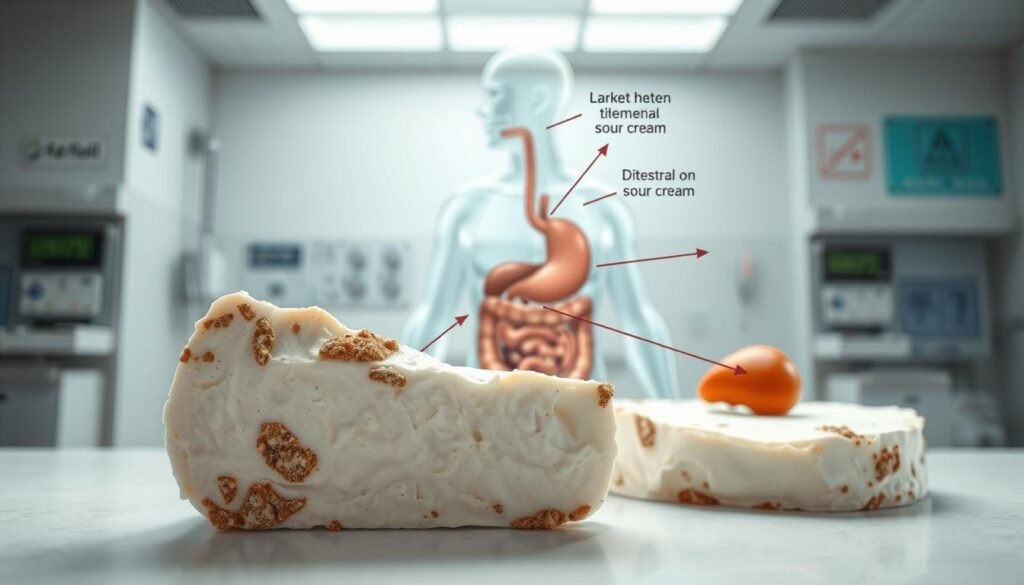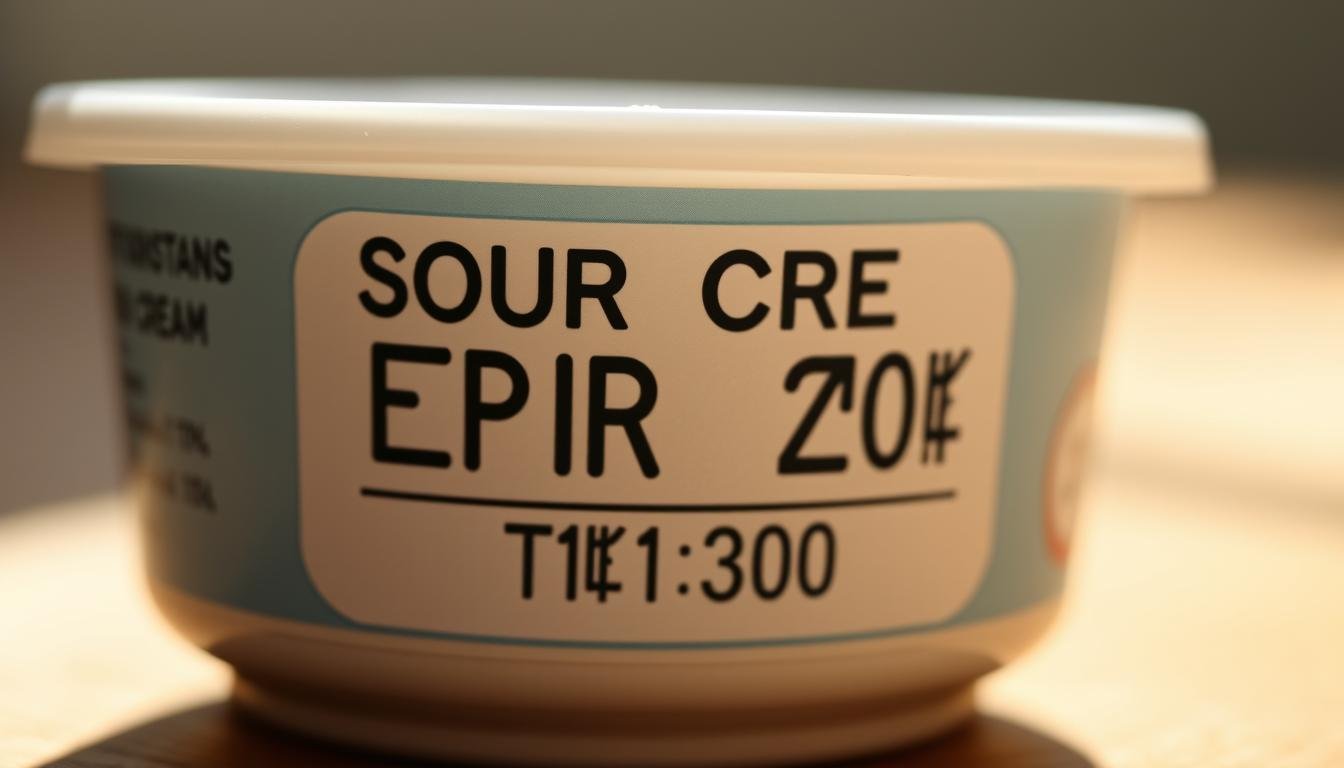Last updated on December 11th, 2025 at 02:21 pm
Can You Eat Sour Cream After Expiration Date? Ever wondered if it’s okay to eat sour cream after it’s expired? You’re not alone. Many of us have hesitated to throw away a nearly full container.
The expiration date on sour cream can be confusing. It makes us unsure if it’s safe to eat. Knowing what this date means and how to spot spoilage is key.
Before we get into the details, remember the expiration date is just one thing to think about. It’s important to know if sour cream is still good to eat after it’s expired. Let’s look into this more to help you feel better about using it.
Contents
- 1 Understanding Sour Cream Expiration Dates
- 2 Can You Eat Sour Cream After Expiration Date?
- 3 Storage Conditions and Handling Practices
- 4 Signs Your Sour Cream Has Gone Bad
- 5 Health Risks of Consuming Spoiled Sour Cream
- 6 Factors Affecting Sour Cream Shelf Life
- 7 Conclusion: Can You Eat Sour Cream After Expiration Date?
- 8 FAQ
- 8.1 What does the expiration date on sour cream mean?
- 8.2 How can I tell if sour cream has gone bad?
- 8.3 Can I still eat sour cream after its expiration date if it’s been stored properly?
- 8.4 What are the health risks of consuming spoiled sour cream?
- 8.5 How can I maximize the shelf life of sour cream?
- 8.6 Can freezing sour cream extend its shelf life?
Understanding Sour Cream Expiration Dates
The expiration date on sour cream is more than just a number. It’s a guide to the product’s freshness and safety. When you pick up a container of sour cream, you’ll see dates like “Best By,” “Sell By,” or “Use By.” Knowing what these dates mean is key to making smart choices about your sour cream’s quality and safety.
“Best By” dates tell you when the sour cream is at its best quality and taste. It’s not a safety date, but a guide for enjoying your sour cream at its peak. On the other hand, “Sell By” dates are for retailers, showing how long they should sell the product. “Use By” dates are about quality, marking the last date for using the product at its best.
It’s important to know these dates are about quality, not safety. The safety of sour cream depends on how it’s stored and handled. By understanding these expiration dates, you can tell if your sour cream is still good to use.
Can You Eat Sour Cream After Expiration Date?
Whether you can eat sour cream after its expiration date depends on a few things. These include how you store and handle it. Expiration dates, like “Best By” or “Use By,” tell us when the product is at its best.
To know if sour cream is still good after its expiration date, look at how you stored it. Keeping it properly stored is key to its quality and safety. [Can You Eat Sour Cream After Expiration Date?]
Storage Conditions and Handling Practices
How you store sour cream affects how long it lasts. Here are some important points:
- Always store sour cream in the fridge at a temperature below 40°F (4°C).
- Keep the container tightly sealed to prevent contamination.
- Avoid leaving sour cream at room temperature for extended periods.
Handling sour cream right is also crucial. Always use a clean spoon and avoid mixing it with other foods or utensils.
If you’ve stored and handled your sour cream correctly, it’s probably still safe to eat after the expiration date. But, always check for signs of spoilage first. Look for an off smell, slimy texture, or mold.
By keeping these tips in mind and following proper storage and handling, you can safely enjoy your sour cream even after the expiration date. [Can You Eat Sour Cream After Expiration Date?]
Signs Your Sour Cream Has Gone Bad
To avoid foodborne illness, it’s key to know when sour cream has spoiled. Sour cream is used in many dishes. Its spoilage can be spotted through different changes.
One early sign is an off smell. Fresh sour cream has a mild, slightly tangy aroma. If it smells strong and bad, it’s likely spoiled. Also, look for mold or slime on its surface.
Changes in texture are another clue. If the sour cream looks curdled, separated, or feels odd, throw it away. Seeing mold or yeast means it’s spoiled.
| Signs | Description |
|---|---|
| Off Smell | Unpleasant or strong odor |
| Visual Changes | Mold, slime, or unusual color |
| Textural Changes | Curdling, separation, or unusual consistency |
Knowing these signs helps you spot spoiled sour cream. This way, you can avoid health risks from bad dairy products. [Can You Eat Sour Cream After Expiration Date?]
Health Risks of Consuming Spoiled Sour Cream
Spoiled sour cream is not just bad tasting; it can cause serious foodborne illnesses. When sour cream goes bad, harmful bacteria like Salmonella and E. coli can grow. These bacteria can lead to mild symptoms or life-threatening conditions.
Eating spoiled sour cream can be risky. It can cause nausea, vomiting, diarrhea, and stomach pain. In severe cases, it can lead to kidney failure or even death. This is especially true for the elderly, young children, and those with weak immune systems.

| Symptoms | Causes | Vulnerable Groups |
|---|---|---|
| Nausea, vomiting, diarrhea, stomach cramps | Salmonella, E. coli, other harmful bacteria | Elderly, young children, people with weakened immune systems |
| Kidney failure, death (in severe cases) | Severe food poisoning | People with pre-existing health conditions |
To stay safe, always check the expiration date and look for signs of spoilage. If unsure, it’s better to throw it away.
Factors Affecting Sour Cream Shelf Life
Knowing what affects sour cream’s shelf life helps you enjoy it longer. Several factors play a big role in keeping it fresh and safe. [Can You Eat Sour Cream After Expiration Date?]
Storage temperature is key. Keep sour cream in the fridge at a temperature below 40°F (4°C). Changes in temperature can shorten its shelf life.
How you handle sour cream matters too. Always use a clean spoon or utensil to scoop it. Also, keep the container sealed when not in use to prevent air from spoiling it faster.
The packaging of sour cream also affects its shelf life. If the container is not airtight or damaged, it can let in air, moisture, and contaminants. This shortens its shelf life.
To keep your sour cream fresh longer, follow these tips:
- Keep it refrigerated at a consistent temperature.
- Use clean utensils when handling.
- Ensure the container is tightly sealed.
By following these guidelines, you can enjoy your sour cream for a longer time while keeping its quality.
Conclusion: Can You Eat Sour Cream After Expiration Date?
Eating sour cream after its expiration date can be risky. It’s important to know what affects its shelf life and how to spot spoilage. [Can You Eat Sour Cream After Expiration Date?]
When checking sour cream, look for mold, sliminess, or an off smell. If unsure, it’s best to throw it away to avoid health risks. Knowing these signs helps you enjoy sour cream safely and keep it fresh.
In summary, sour cream can be safe to eat after its expiration date if stored right. But, always check for spoilage signs before eating. Can you eat sour cream after expiration date? Yes, but only if it’s within a reasonable time and shows no spoilage.
See Also: Can You Eat Eggs 2 Days After Expiration?
FAQ
What does the expiration date on sour cream mean?
The expiration date on sour cream, like “Best By” or “Sell By,” shows when it’s at its best. It’s not a safety date. It helps you know when the sour cream is still good.
How can I tell if sour cream has gone bad?
Look for mold, slime, or an odd smell to see if sour cream has gone bad. If it looks curdled or separated, it’s best to throw it away. [Can You Eat Sour Cream After Expiration Date?]
Can I still eat sour cream after its expiration date if it’s been stored properly?
If sour cream is stored in the fridge at 40°F (4°C) or below, it might still be okay after its expiration date. But, always check for signs of spoilage before eating it.
What are the health risks of consuming spoiled sour cream?
Eating bad sour cream can cause foodborne illnesses like salmonella or listeria. Symptoms include nausea, vomiting, and stomach pain. It can be serious, especially for the elderly, pregnant women, and young kids.
How can I maximize the shelf life of sour cream?
Keep sour cream in the fridge at 40°F (4°C) or below. Always check the expiration date before buying. Use clean utensils to avoid contamination. [Can You Eat Sour Cream After Expiration Date?]
Can freezing sour cream extend its shelf life?
Freezing sour cream can make it grainy or separated. It might still be safe to eat, but the quality will be lower. It’s better to use it fresh or store it in the fridge.

Hello, I am Bellamy George, a certified nutritionist and food safety specialist from Springfield, IL. With a degree in Food Science, I share research-backed insights on edible foods, seeds, and seafood for safe, informed eating.

